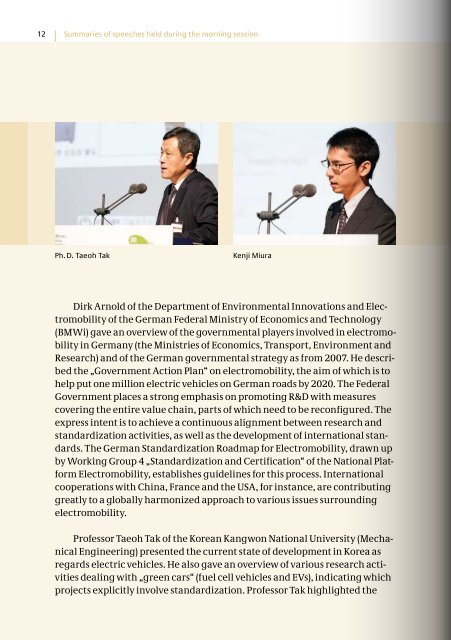International Conference on Electromobility Standardization
International Conference on Electromobility Standardization
International Conference on Electromobility Standardization
You also want an ePaper? Increase the reach of your titles
YUMPU automatically turns print PDFs into web optimized ePapers that Google loves.
12 Summaries of speeches held during the morning sessi<strong>on</strong><br />
13<br />
Ph. D. Taeoh Tak<br />
Kenji Miura<br />
Dirk Arnold of the Department of Envir<strong>on</strong>mental Innovati<strong>on</strong>s and <strong>Electromobility</strong><br />
of the German Federal Ministry of Ec<strong>on</strong>omics and Technology<br />
(BMWi) gave an overview of the governmental players involved in electromobility<br />
in Germany (the Ministries of Ec<strong>on</strong>omics, Transport, Envir<strong>on</strong>ment and<br />
Research) and of the German governmental strategy as from 2007. He described<br />
the „Government Acti<strong>on</strong> Plan“ <strong>on</strong> electromobility, the aim of which is to<br />
help put <strong>on</strong>e milli<strong>on</strong> electric vehicles <strong>on</strong> German roads by 2020. The Federal<br />
Government places a str<strong>on</strong>g emphasis <strong>on</strong> promoting R&D with measures<br />
covering the entire value chain, parts of which need to be rec<strong>on</strong>figured. The<br />
express intent is to achieve a c<strong>on</strong>tinuous alignment between research and<br />
standardizati<strong>on</strong> activities, as well as the development of internati<strong>on</strong>al standards.<br />
The German Standardizati<strong>on</strong> Roadmap for <strong>Electromobility</strong>, drawn up<br />
by Working Group 4 „Standardizati<strong>on</strong> and Certificati<strong>on</strong>“ of the Nati<strong>on</strong>al Platform<br />
<strong>Electromobility</strong>, establishes guidelines for this process. <str<strong>on</strong>g>Internati<strong>on</strong>al</str<strong>on</strong>g><br />
cooperati<strong>on</strong>s with China, France and the USA, for instance, are c<strong>on</strong>tributing<br />
greatly to a globally harm<strong>on</strong>ized approach to various issues surrounding<br />
electromobility.<br />
Professor Taeoh Tak of the Korean Kangw<strong>on</strong> Nati<strong>on</strong>al University (Mechanical<br />
Engineering) presented the current state of development in Korea as<br />
regards electric vehicles. He also gave an overview of various research activities<br />
dealing with „green cars“ (fuel cell vehicles and EVs), indicating which<br />
projects explicitly involve standardizati<strong>on</strong>. Professor Tak highlighted the<br />
system approach followed in Korea as exemplified by the Korean Nati<strong>on</strong>al<br />
Smart Grid Roadmap issued in 2010. The standardizati<strong>on</strong> structures established<br />
in Korea will ensure a cross-sectoral, cross-technology implementati<strong>on</strong><br />
of the planned tasks. In face of the different charging system designs being<br />
developed throughout the world, Korea has developed its own plug standard<br />
which is nevertheless compatible with the IEC 62196-2 Type 1 plug. Prof. Tak<br />
c<strong>on</strong>cluded by describing the Korean standardizati<strong>on</strong> roadmaps for charging<br />
systems, vehicle systems and batteries, all three of which clearly illustrate<br />
a primary interest in the internati<strong>on</strong>al harm<strong>on</strong>izati<strong>on</strong> of standards. However,<br />
Tak identified this harm<strong>on</strong>izati<strong>on</strong> as the greatest challenge, while at<br />
the same time emphasizing Korea‘s willingness to become involved in this<br />
process.<br />
Kenji Miura, Deputy Director of the Electric Vehicle and Advanced<br />
Technology Office of the Japanese Ministry of Ec<strong>on</strong>omy, Trade and Industry<br />
began his presentati<strong>on</strong> by discussing the impact of the 2011 „Great East<br />
Japan Earthquake“ <strong>on</strong> the Japanese automobile industry, the problems this<br />
has created, and the means for an intelligent recovery. C<strong>on</strong>crete goals have<br />
been set for the introducti<strong>on</strong> of electric vehicles in Japan, beginning with the<br />
development of battery technology (reducing costs by half by 2015) and of<br />
the charging infrastructure. Several measures to this end have already been<br />
introduced, such as the support of R&D activities, the installati<strong>on</strong> of charging<br />
stati<strong>on</strong>s and numerous promoti<strong>on</strong>al activities to create initial demand<br />
am<strong>on</strong>g the public; these last have been carried out in 18 „EH/PHV towns“, or<br />
model regi<strong>on</strong>s and cities. Like the preceding speakers, Mr. Miura also emphasized<br />
the great importance of standardizati<strong>on</strong> by pointing out the need<br />
for internati<strong>on</strong>al cooperati<strong>on</strong> am<strong>on</strong>g industry and governments, as well as<br />
between ISO and IEC, and the challenges this cooperati<strong>on</strong> will bring, al<strong>on</strong>g<br />
with the necessity of a system approach to electromobility.


